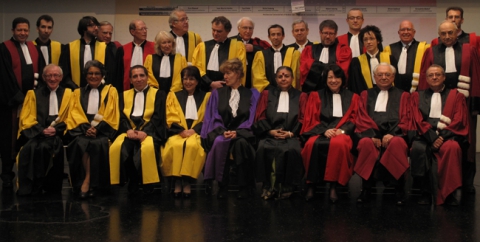
Mohsen Makhmalbaf Speech after receiving the Honorary Cinematic Doctorate Award from University of Nanterre in France:
Ladies and gentlemen, Honourable professors!
I would have preferred to talk about art and cinema only, but how could I possibly forget my fellow filmmakers, and their difficult situation in Iran, today.
The Iranian filmmaker places the cinema as a mirror in front of the society, in order to bring people back to its own truth, the people who has been bombarded with lies by the state television and state cinema.
Indeed, it is the Iranian filmmaker’s realism, which sends him in the prison. It is his very realism which condemns the Iranian filmmaker to censorship. It is indeed, this realism which costs the Iranian filmmaker, his or her passport. Finally, it is this very realism, which brands the Iranian filmmaker with the exile. This is the reality of cinema, today, in Iran.
Those of us who have remained in Iran are not only subjected to censorship, but constantly risk of arrest, and torture.
And those filmmakers who migrated, although attaining a degree of personal freedom, but suffer other hardships for the creation of their poetical art. If the Iranian filmmakers are crushed under ideological censorship in their own country, they are crushed by the money censorship in the free world. It has been more than half a century now that Iranian independent filmmakers, like other independent filmmakers worldwide have been fighting against Hollywood’s industrial cinema, a Hollywood where art has changed to an industrial article, such as McDonalds.
A movie-making machine which dominates 90% of all theatres, and does not allow the independent art to have a breathing space through the cinema’s tribune.
If the war of the Iranian filmmaker in his country is the war of poetry and politics, the Iranian filmmaker’s conflict in exile is that between remaining a poet and becoming a merchant.
There is political freedom here, but you as an art filmmaker are boycotted by money.
I have personally experienced both of these situations. Outside Iran, I try to overcome the temptations of Hollywood, so as to remain faithful to poetry and cinema. And within Iran I have faced the censorship of my films and books, to such an extent that I had to become an exile. And today, should I return to Iran, I shall face a death sentence.
Some of my films and books never got out of the censorship’s grip and have remained so for many years. Today in Iran all the works bearing my name are under complete censorship.
Last year, a film for which I had written the screen play was granted permission for screening on the one condition that my name would be omitted as the screen writer (The film called ‘Poet of the waste’).
Two months ago, a film by an Iranian filmmaker, namely, Asghar Farhadi, was banned just because he had mentioned my name amongst a few other filmmakers and had wished for our return to Iran.
A while ago, another well-known Iranian filmmaker, Jafar Panahi, spent three months behind bars, because he was making a film in his own home. Currently, Mohammad Nouri Zad, the honest filmmaker is under torture in prison for the guilt of having addressed an open-letter, from his cell, to the Supreme Leader, asking him to stop killing our youth.
About three years ago, while shooting a film in Afghanistan, we were the target of an attack by a bomb, organized by the Revolutionary Guards of Iranian regime.
Leaving some 20 injured and one dead. The person who died was a 43 year old extra who had come to the cinema for a day’s salary; and without knowing why, he became a victim of the Iranian dictatorship.
Last year, millions of the Iranian people took to the streets to shout for freedom. They used their mobile phones cameras to send their real image to the world. These pictures, which in my view, are more effective than the whole history of the Iranian cinema in changing the situation of the Iranian nation.
About a year ago, fifteen thousands of these young men and women were to be sent behind bars where about a hundred of them were to be met with death. Every single one of them deserves, far more than I do, to be honored, here and today.
Honourable professors! Permit me to accept this honorary doctorate as a loan in the hope of freedom for Iran. Until the day when, in my homeland Iran, I will be able to present it to the mothers whose children had the honour of martyrdom in the name of freedom before they could receive an honorary doctorate.
Thank you
November 18, 2010
Direct Link to watch part of the video of: the award ceremony

